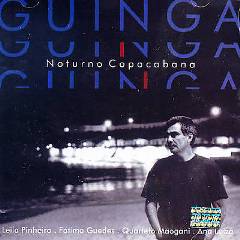Guinga – Noturno Copacabana (2003)
Guinga – Noturno Copacabana (2003)

1. Garoa e maresia 2. Abluesado 3. O silêncio de Iara 4. Desavença 5. Noturno Copacabana 6. Depois do sonho 7. Concubinato 8. Senhorinha 9. Na surdina 10. Rasgando seda 11. Para Jackson e Almira 12. Fonte abandonada 13. Dichavado 14. Canção desnecessária Guinga - violin Lula Galvão - guitar Jorge Helder -bass Carlos Malta - flute Paulo Sergio Santos - clarinet Jessé Sadoc – flugelhorn Nailor Proveta Azevedo - sax alto Marcelo Martins - sax tenor Sergio de Jesus - trombone Bocão - trombone Flavio Melo - trumpet Nelson Oliveira - trumpet Jessé Sadoc – trumpet Paulo Sergio Santos - clarone Armando Marçal – percussion João Cortez - drums David Chew – cello Gilson Peranzzetta - accordion Ana Luiza – vocals Fatima Guedes – vocals
Guinga began his musical studies as a self-taught violonista at 13. Later, he would deepen his apprenticeship of classical violão. At 16, he began to write his own compositions and in 1967, he presented one of them at II FIC (Rede Globo, Rio). In 1973, MPB-4 recorded two of his songs written with the illustrious Paulo César Pinheiro: "Conversa Com o Coração" and "Maldição de Ravel." Always flirting with the musical scenery, but was unable to make a living in it (as many sincere artists in Brazil). He became a dentist, but nevertheless registered his love for the true Brazilian tradition in appearances as sideman in several samba albums since then, like the second solo album by Cartola recorded in 1976, in which he plays the violão on "As Rosas Não Falam." As an instrumentalist, he has accompanied such artists as Beth Carvalho, Cartola, Alaíde Costa, Clara Nunes, and João Nogueira. His first solo show is from 1989, where he performed in the Vou Vivendo nightclub (São Paulo) with Paulo César Pinheiro and Ithamara Koorax. His first solo album, Simples e Absurdo (Velas 1991), featured lyrics by Aldir Blanc and special guests Chico Buarque, Cláudio Nucci, Leila Pinheiro, Paulinho Malaguti, Ivan Lins, Zé Renato, Leny Andrade, Be Happy, and others. His second album is Delírio Carioca (Velas 1993), with special guests Djavan, Boca Livre, and Leila Pinheiro. The third album, Cheio de Dedos (1996), is almost entirely instrumental, with special guests Chano Dominguez, Diapasón, Chico Buarque, Nó em Pingo D'água, and Ed Motta. This one was awarded with the Prêmio Sharp in 1996 in three separate categories: Best Instrumental Album, Best Instrumental Song ("Dá o Pé Loro," by Guinga), and Best Production (Paulo Albuquerque).
In 2000, they released a fourth album, Suíte Leopoldina (Velas), with special guests Toots Thielemans ("Dos Anjos" and "Constance"), Chico Buarque/Nei Lopes ("Parsifal"), Alceu Valença ("Chá de Panela"), Ivan Lins ("Guia de Cego"), Lenine ("Mingus Samba"), and Ed Motta ("Par Constante"). Since 1993, he has become an international artist, performing at the Festival Internacional de Guitarra (Cordoba, Spain), and the Festival Braziliana -- Jazz House (Copenhagen, Denmark). His compositions have been recorded by such artists as Paulo César Pinheiro, Elis Regina, Cauby Peixoto, Leila Pinheiro, Sérgio Mendes, Turíbio Santos, and others. ---Alvaro Neder, Rovi
download: uploaded filecloudio anonfiles yandex 4shared solidfiles mediafire mega nornar








